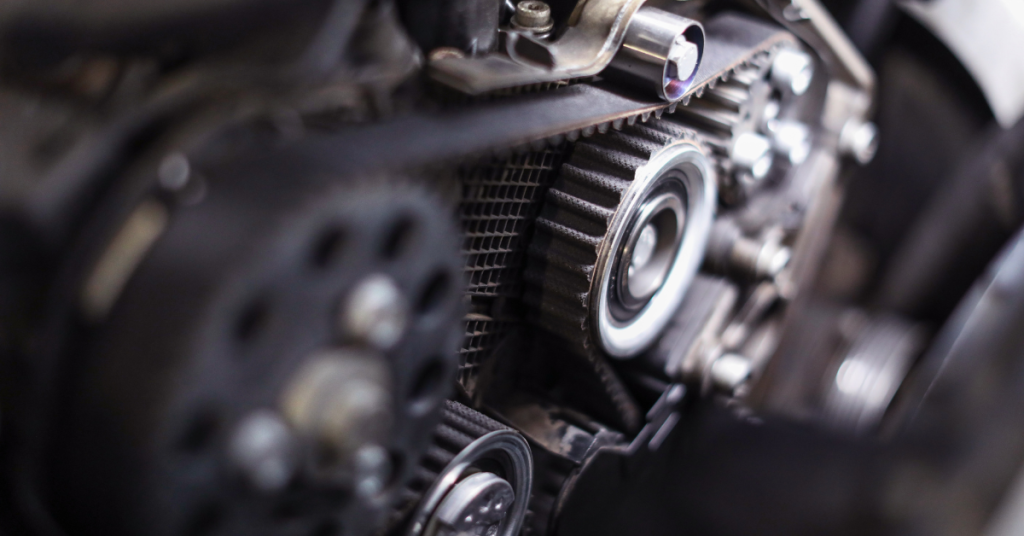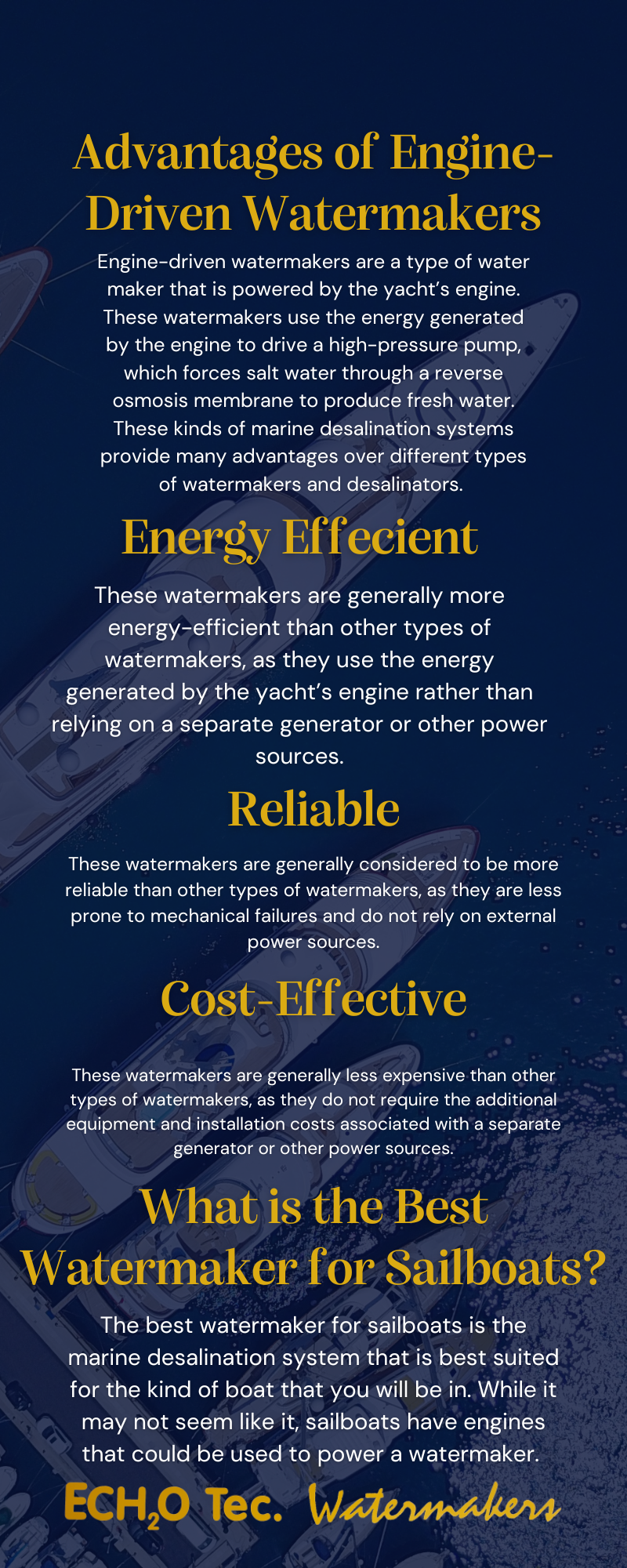
Engine-driven watermakers are a type of water maker that is powered by the yacht’s engine. These watermakers use the energy generated by the engine to drive a high-pressure pump, which forces salt water through a reverse osmosis membrane to produce fresh water. These kinds of marine desalination systems provide many advantages over different types of watermakers and desalinators. We offer many different kinds of watermakers, so we understand exactly what you could come to expect from every kind of desalinator. To learn if an engine-driven watermaker is the right choice for you and which ones our marine desalinations systems provider offers, continue reading below.
What Are the Different Types of Fresh Watermakers?
While most modern watermakers are engine powered, they are not the only watermakers available for purchase. When choosing a freshwater maker for your yacht or boat, it’s important to consider factors such as the water quality in your area, your water usage needs, and your available power sources. There are other kinds of watermakers designed to run on other power sources like shore power and even separate power generators. In fact, some watermakers are designed to be powered by AC (electricity) and can be plugged into a shore power outlet when the boat or yacht is docked. There are also some boat desalinators for sale that are designed to run on DC power, such as a 12-volt battery system or a solar panel array. The model that you choose is entirely dependent on the yacht or boat’s specific model and design, as well as the power sources available on the boat or yacht.
Advantages of Engine-Driven Watermakers
- Energy-efficient: These watermakers are generally more energy-efficient than other types of watermakers, as they use the energy generated by the yacht’s engine rather than relying on a separate generator or other power sources.
- Reliable: These watermakers are generally considered to be more reliable than other types of watermakers, as they are less prone to mechanical failures and do not rely on external power sources.
- Cost-effective: These watermakers are generally less expensive than other types of watermakers, as they do not require the additional equipment and installation costs associated with a separate generator or other power sources.
What Is the Best Watermaker for Sailboats?
The best watermaker for sailboats is the marine desalination system that is best suited for the kind of boat that you will be in. While it may not seem like it, sailboats have engines that could be used to power a watermaker. The best watermaker for sailboats is the one that best fits on your boat and the one that provides the perfect amount of water for the people that will be on your boat.
How Much Power Does a Watermaker Use?
The power consumption of a watermaker can vary significantly depending on its size, capacity, and the technology it employs. As a rough estimate, many engine-driven watermakers for marine applications might require around 0.5 to 1 gallon of diesel fuel to produce 1 gallon of fresh water. This is a very general estimate, and the actual fuel consumption can vary based on the factors mentioned earlier. It’s important to consider the efficiency of the engine and watermaker combination, as well as the engine’s overall power output, to determine the specific power consumption of a particular system. One of the most popular engine-driven boat watermakers that we offer is our belt-driven watermaker.
How Do Sailboats Get Drinking Water?
Even though it may seem like sailboats may not have the capability to enjoy engine-driven watermakers for yachts, you may be surprised by what sailboats can do to get water. For one, sailboats could use a generator to produce the energy needed to power a watermaker. Some of our most popular products for this purpose include our AC sailboat desalination systems. Also, many sailboats come equipped with engines or use an outboard motor.
Do Boats Use AC or DC Power in Their Desalination Systems?
Boats can use both AC (alternating current) and DC (direct current) power, depending on their electrical systems and the equipment onboard. DC power is primarily used by many smaller boats, and sailboats primarily use DC power systems. DC systems are often used for essential functions like starting the engine, running navigation lights, powering radios, and operating basic electronics. DC power is generated by the boat’s batteries and may be charged by the engine’s alternator or through solar panels and wind generators.
On the other hand, AC power is used by larger boats, yachts, and even oil riggers with more extensive electrical demands. AC systems are used to operate appliances, air conditioning units, larger galley equipment, and power outlets for charging devices. AC power is typically provided by an onboard generator or by connecting to shore power when the boat is docked at a marina.
What Is the Most Common Boat Engine Used to Power Watermakers?
While there are many different kinds of engines on boats, the most common ones are the outboard motors. This is because outboard motors can be easily attached to a wide range of boat sizes and types, from small dinghies to larger fishing boats and recreational vessels. This versatility makes them a popular choice for boaters with various needs. You could use these engines to power your boat’s systems by charging a generator.
Can You Drink Water From a Watermaker on a Boat?
Yes, water produced by a properly functioning watermaker on a boat is generally safe and suitable for drinking. Watermakers use a process called reverse osmosis to remove salt, impurities, and contaminants from seawater or brackish water, producing clean and potable freshwater. Watermakers could also give you the fresh water you need to run a shower or clean your dishes.
More About ECHOTec Watermakers
ECHOTec Watermakers is here to help our potential customers with finding the marine desalination system that is best for them. Our full suite of products includes marine systems, home desalination systems, and even solar-powered water makers. Contact us today to learn more about how to turn saltwater into freshwater with one of our engine-driven watermakers.


